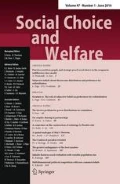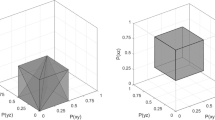Abstract
We present a model that is closely related to the so-called models of choice under complete uncertainty, in which the agent has no information about the probability of the outcomes. There are two approaches within the said models: the state space-based approach, which takes into account the possible states of nature and the correspondence between states and outcomes; and the set-based approach, which ignores such information, and solves certain difficulties arising from the state space-based approach. Kelsey (Int Econ Rev 34:297–308, 1993) incorporates into a state space-based framework the assumption that the agent has ordinal information about the likelihood of the states. This paper incorporates this same assumption into a set-based framework, thus filling a theoretical gap in the literature. Compared to the set-based models of choice under complete uncertainty we introduce the information about the ordinal likelihood of the outcomes while, compared to Kelsey’s approach, we incorporate the advantages of describing uncertainty environments from the set-based perspective. We present an axiomatic study that includes adaptations of some of the axioms found in the related literature and we characterize some rules featuring different combinations of information about the ordinal likelihood of the outcomes and information about their desirability.
Similar content being viewed by others
References
Anscombe FJ, Aumann RJ (1963) A definition of subjective probability. Ann Math Stat 34: 199–205
Arlegi R (2003) A note on Bossert, Pattanaik and Xu’s choice under complete uncertainty: axiomatic characterizations of some decision rules. Econ Theory 22: 219–225
Arlegi R (2007) Sequentially consistent rules of choice under complete uncertainty. J Econ Theory 135: 131–143
Arrow KJ, Hurwicz L (1972) An optimality criterion for decision-making under ignorance. In: Carter CF, Ford JL (eds) Uncertainty and expectations in economics. Blackwell, Oxford, pp 1–11
Barberà S, Barrett CR, Pattanaik PK (1984) On some axioms for ranking sets of alternatives. J Econ Theory 33: 301–308
Barberà S, Bossert W, Pattanaik PK (2004) Ranking sets of objects. In: Barberà S, Hammond PJ, Seidl C (eds) Handbook of utility theory, vol. 2. Kluwer, Boston, pp 893–977
Barberà S, Jackson M (1988) Maximin, leximin and the protective criterion. J Econ Theory 46: 34–44
Barrett CR, Pattanaik PK (1955) Decision making under complete uncertainty: the ordinal framework. In: Dickinson D, Sen S (eds) Uncertainty and risk in economic life. Edward Elgar, Aldershot, pp 20–38
Bossert W (1989) On the extension of preferences over a set to the power set: an axiomatic characterization of a quasiordering. J Econ Theory 49: 84–92
Bossert W (1995) Preference extension rules for ranking sets of alternatives with a fixed cardinality. Theory Decis 39: 301–317
Bossert W, Pattanaik PK, Xu Y (2000) Choice under complete uncertainty: axiomatic characterizations of some decision rules. Econ Theory 16: 295–312
Cohen M, Jaffray JY (1980) Rational behaviour under complete ignorance. Econometrica 48: 1281–1299
Gärdenfors P (1976) Manipulation of social choice functions. J Econ Theory 13: 217–228
Hammond PJ (1999) Subjective expected utility. In: Barbera S, Hammond P, Seidl C (eds) Handbook of utility theory, vol. 1. Kluwer, Dordrecht
Jaffray JY (1989) Linear utility theory for belief functions. Oper Res Lett 8: 107–112
Jaffray JY (1991) Linear utility theory and belief functions: a discussion. In: Chikàn A (ed) Progress in decision, utility and risk theory. Kluwer, Dordrecht
Kannai Y, Peleg B (1984) A note on the extension of an order on a set to the power set. J Econ Theory 32: 172–175
Kelsey D (1993) Choice under partial uncertainty. Int Econ Rev 34: 297–308
Maskin E (1979) Decision making under ignorance with implications for social choice. Theory Decis 11: 319–337
Nitzan S, Pattanaik PK (1984) Median-based extensions of an ordering over a set to the power set: an axiomatic characterization. J Econ Theory 34: 252–261
Pattanaik PK, Peleg B (1984) An axiomatic characterization of the lexicographic maximin extension of an ordering over a set to the power set. Soc Choice Welf 1: 113–122
Savage LJ (1972) The foundations of statistics. Wiley, New York
Author information
Authors and Affiliations
Corresponding author
Rights and permissions
About this article
Cite this article
Alcalde-Unzu, J., Arlegi, R. & Ballester, M.A. Uncertainty with ordinal likelihood information. Soc Choice Welf 41, 397–425 (2013). https://doi.org/10.1007/s00355-012-0689-8
Received:
Accepted:
Published:
Issue Date:
DOI: https://doi.org/10.1007/s00355-012-0689-8




